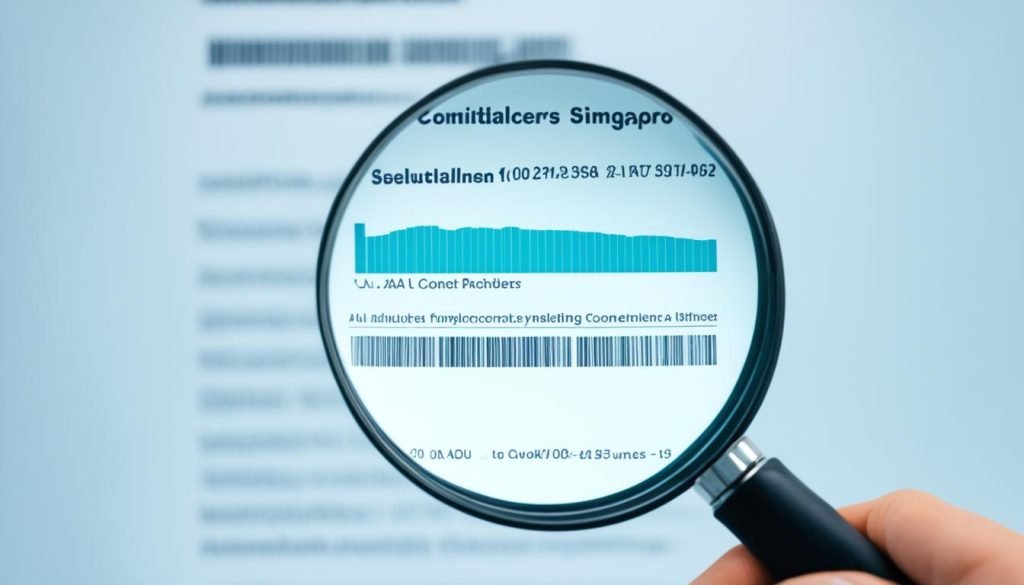Did you know the Singapore Code of Advertising Practice changed in February 2008? The Advertising Standards Authority of Singapore (ASAS) updated this guide. It provides rules and standards for advertisers in the Singapore market.
This code covers many parts of advertising. It talks about how ads should be clearly marked. It also sets rules for different fields like healthcare and finance. Plus, it tells about proper ways to do interactive and direct marketing.
The code says self-regulation is key. Advertisers should also follow national and global advertising laws. This ensures ads are ethical and fair.
Key Takeaways:
- The Singapore Code of Advertising Practice is a comprehensive set of guidelines and regulations for advertisers.
- The Code covers various aspects of advertising, including identification of advertisements, regulations for different industries, and guidelines for interactive and direct marketing.
- Adherence to the Code is essential for maintaining ethical advertising practices in the Singapore market.
- Self-regulation and compliance with national and international advertising laws are emphasized in the Code.
- ASAS plays a crucial role in enforcing the Code and has the power to ask advertisers to amend or withdraw non-compliant advertisements.
Overview of the Advertising Control System in Singapore
The Advertising Control System in Singapore is overseen by the Advertising Standards Authority of Singapore (ASAS). It works together with 14 organizations and government agencies. This shows how many are involved in keeping advertising fair in the country.
The Code of Advertising Practice in Singapore was last updated in February 2008. It accounts for changes in society, the ways we advertise, and technology. This makes sure that the rules of advertising evolve to fit today’s world.
“ASAS relies on a system of guidance and voluntary compliance for effective enforcement, rather than punitive measures.”
The Advertising Standards Authority of Singapore prefers to help advertisers obey the rules. It isn’t quick to punish. Instead, it guides them, promoting a sense of duty and care in the industry.
ASAS can ask advertisers to change or take down ads that don’t follow the rules. This gives them the power to make sure ads meet the standards, no matter where they are shown.
They can also help solve arguments within advertising groups. And give important advice to companies not in these groups. This makes sure all ads meet the same high standards and encourage good practices.
To complain about an ad in Singapore, you need to write a letter. You should include details, like a cut-out ad or commercial script. This lets ASAS properly check the complaint.
“ASAS may call on relevant parties for information regarding advertising complaints and requests for substantiation, imposing potential sanctions for non-compliance.”
ASAS can ask for more info to check advertising complaints. If needed, they may set a deadline for this info. They can also give a penalty if the deadline is not met.
Companies must get their ads checked before they go out. This is to make sure they follow the rules well. It gives them time to correct any mistakes.
Not following the rules can get a company in trouble. For example, they might have to pay more for an apology ad than usual. This reminds them to be careful with their ads.
If a company is having a lucky draw open to the public, they must follow special rules. They need to tell the police about it at least four weeks ahead. This helps make sure the event follows the law and is done in a fair way.
“Advertisements promoting cigarettes, tobacco brands, and smoking are prohibited by law.”
In Singapore, ads for cigarettes, tobacco, or smoking are not allowed. This shows how serious the government is about public health and not promoting harmful habits.
Even ads for things like clothes or cars that use a tobacco brand name need special permission. The Health Sciences Authority has to check them. This is to make sure they don’t harm public health or trick consumers.
The Monetary Authority of Singapore made new rules about showing money in ads in 2006. These rules stop ads from hurting people’s trust in Singapore’s money.
Ads in Singapore must always be honest and clear. They can’t say things that are misleading, unclear, or too good to be true. This is to make sure people can trust what the ads say.
Words like “best” or “greatest” are your opinion and you don’t need to prove them. But, you must be fair and clear. Don’t say things that are not true just to compete. This can confuse people and damage trust.
The Advertising Control System in Singapore, led by ASAS, is very important. It makes sure ads are ethical and follow the rules. Advertisers must know and follow these rules to gain the public’s trust and keep advertising responsibly.
General Principles in Ad Policies
The Code of Advertising Practice in Singapore has key rules. It focuses on honest, ethical, and true advertising. Companies there must follow these rules when they market their products.
This code wants advertisers to be honest and clear with their customers. They can’t make fake or tricky ads. It’s important to show information in a way that’s easy to understand and fair. Advertisers must also clearly say who they are and provide any necessary warnings.
By sticking to these rules, advertisers make their ads trustworthy. This helps build trust with the people who see their ads. Being upfront and truthful keeps Singapore’s advertising world strong and moral.
Advertising in Singapore also needs to follow the code’s spirit, not just the rules on paper. This means ads should do good and not mislead or harm anyone. The code highlights that the industry should watch over itself. Advertisers need to ensure they behave well without needing someone always looking over their shoulder.
Guidelines for Different Advertising Categories
In Singapore, the Code of Advertising Practice offers rules for various ad types. These rules are broad, covering many industries. They aim to keep ads truthful, clear, and within the law. For companies, following these rules is key to running ethical ads.
Medical Advertising Regulations
Rules for medical ads in Singapore are very strict. They focus on keeping people safe and informed. Advertisers need to describe their products correctly and share any risks. This includes information about side effects and who should avoid using the product.
Financial Services Advertising Guidelines
Ads for financial services must be easy to understand. The rules say everything must be clear, including any costs or risks. They make sure customers know what they’re getting into.
Slimming Products Advertising Rules
Ads for slimming products and services have specific rules. These rules aim to stop false claims and promote healthy weight loss. Advertisers should avoid making promises that seem too good to be true.
Environmental Claims Restrictions
When ads talk about the environment, they need to prove they’re making a real difference. The rules don’t allow false statements or deceit. Their goal is to make sure ads truly reflect a product’s green impact.
Motoring Advertisements Regulations
Advertisements about vehicles and driving must follow rules. They focus on facts about cars, like fuel efficiency and car safety. It’s important to list the correct prices and specs of the vehicles as well.
Focusing on these advertising rules helps in many ways. It builds trust with buyers and ensures ads are fair. This creates an honest advertising environment in Singapore.
Identification of Advertisements
In Singapore, the Code of Advertising Practice is key in making ads clear and honest. It ensures ads are easy to separate from news or other content. Advertisers must make sure people know when they are seeing an ad.
This code tells how ads should look so they’re not confusing. For example, ads must say clearly that they are ads. This is good because it helps avoid tricking people with ads that look like something else.
Helping people spot ads means they can trust what they see. When people trust ads, it’s good for both the sellers and the buyers. It makes the whole advertising world better.
Labeling Requirements and Formats
The Code of Advertising Practice has rules on labeling ads in different places. These rules make sure ads don’t look like something they’re not. For instance, ads must use words like “Advertisement” or “Ad” so people know it’s an ad.
- Using clear and visible labels such as “Advertisement” or “Ad” to indicate the presence of advertising content.
- Using distinct visual markers, such as borders or color schemes, to differentiate advertisements from surrounding content.
- Ensuring that labels are prominently placed and easily identifiable, even on smaller screens or in print media.
- Using contrasting fonts or typefaces to highlight advertisements and make them stand out from other text.
These rules make it easier for people to tell what’s an ad from what isn’t. This helps people browsing online or reading stuff know exactly what they’re looking at.
“Transparency in advertising is crucial for building trust with consumers. By clearly labeling advertisements, advertisers show their commitment to providing honest and open communication with their audience.”
Preventing Consumer Confusion
The code helps people not get mixed up by ads. Knowing what is an ad and what isn’t lets us think clearly about what we’re being told. This way, we can choose what to believe about the things ads are selling.
Making ads stand out from other things helps keep ads fair. It stops ads from trying to trick us, which keeps advertising honest. This makes things better for both people making ads and those seeing them.
Reporting Non-Compliant Advertisements
If you see an ad that doesn’t follow the rules, you can tell the Advertising Standards Authority of Singapore (ASAS). Write about what you saw and why it was wrong to the ASAS Chairman. Make sure to include facts about the ad.
Sending in proofs like a piece of the ad or what it said is a good idea. Also, share your contact info. This way, ASAS can ask you more if they need to.
| Reporting Process for Non-Compliant Advertisements | Contact Information |
|---|---|
| Address complaints in writing to the Chairman of ASAS | Chairman, Advertising Standards Authority of Singapore |
| Include sufficient details about the non-compliant advertisement | Email: asas@case.org.sg |
| Attach a cutting of the advertisement or the full text of the commercial | Phone: +65 6461 1500 |
| Provide contact information for the complainant | Address: 170 Ghim Moh Road, #05-01 Ulu Pandan Community Building, Singapore 279621 |
By telling ASAS about misleading ads, you’re helping keep advertising fair. Your report is important to making sure ads follow the rules. This way, ads are clear and honest in Singapore.
Compliance and Enforcement
The Advertising Standards Authority of Singapore (ASAS) makes sure ads meet policies and keep people’s trust. They enforce the Code of Advertising Practice. ASAS is in charge of making sure ads in Singapore are ethical and correct.
Advertisers must follow the Code of Advertising Practice’s rules because of ASAS. Their ads must be true, proven, and not tricky. This is what the webinar on Singapore’s Ad Policies, by McDermott Will & Emery and ACC Chicago, taught. Following FTC advertising rules is also very important for ad success.
If ads don’t follow the code, ASAS can ask to change or pull them. Serious rule-breakers might face penalties. These penalties can include losing their right to advertise. This keeps the market fair and safe for customers.
If you think an ad breaks the rules, you can tell ASAS about it. ASAS will check your complaint and give a decision. They make sure ads stick to the right standards.
Being clear about ads is key to following the rules. Advertisers can’t hide bad reviews. They must be open and honest with customers. This is also vital in social media and endorsements. Advertisers have to say if there’s any connections between reviewers and products.
Promotions must also follow laws about the state, intellectual property, and privacy. Advertisers need to understand the differences between sweepstakes, lotteries, and contests. They must carefully make rules for their promotions. Doing these things helps advertisers stay on the right side of the law.

| Penalties for Non-Compliance | Regulatory Authority | Advertising Complaint Procedures |
|---|---|---|
| ASAS can impose penalties, including the withdrawal of facilities, rights, or services, for severe non-compliance with the code. | The Advertising Standards Authority of Singapore (ASAS) serves as the regulatory authority for advertising in Singapore. | Individuals who believe an advertisement breaches the code can file a complaint with ASAS, initiating the advertising complaint procedures. |
Digital Advertising and Online Platforms
In Singapore, the rules of advertising cover digital and online advertising. This includes ads on social media, interactive ads, and influencer partnerships. Advertisers must follow these codes when making their ads.
On social media, ads should meet the same fairness and honesty rules as ads on TV. Advertisers must clearly show if something is an ad. And they should provide any extra information people need to know.
Ads that let you play a game or do something with the ad also have rules. They must be honest and clear. The information in them should be right and true for everyone.
Working with influencers is a big part of advertising online now. Advertisers have to ensure that influencers follow the rules. This means being honest about paid posts and making sure the ads are right for the guidelines.
The ASAS in Singapore wants to keep advertising fair on the internet. Advertisers need to know these rules well to keep the trust of the people seeing their ads.

Statistics and Insights
Meta has rules for digital ads and keeps them up to date. This helps keep ads fair on platforms like Facebook and Instagram.
They share updates on how well they are enforcing their rules. Advertisers learn about how effective the rules are from these updates.
Meta’s report on enforcing community standards offers insights. It shows how well the platform is keeping content in line with their rules.
They also share what kind of content is popular on Facebook. This helps advertisers see what people like to engage with the most.
There is a report on why some content must be restricted. This report tells advertisers which rules to be especially careful about. It helps them avoid breaking any laws.
Importance of Self-Regulation in Advertising
Self-regulation is key to maintaining high ethical standards in Singapore’s ads. Advertisers adhere to the Code of Advertising Practice. This builds trust in ads, saving time and avoiding legal battles.
By choosing to meet advertising standards, companies show they are accountable and open. This makes ads more dependable for consumers. It means the messages in ads are fair and truthful.
Unlike other industries, advertising in Singapore focuses a lot on self-discipline. The ASAS asks companies to join in by choice, rather than forcing them. This keeps advertising honest without being too strict.
In 2008, ASAS started watching over advertising in Singapore. It’s backed by groups like the Association of Broadcasters and the Health Sciences Authority. Together, they enforce the rules laid out in the Singapore Code of Advertising Practice, updated in 2008.
If an ad breaks the Code, ASAS can ask for changes or for the ad to be removed. They might also bring other media companies into the discussion. This is how conflicts about ads get resolved. Companies should know ASAS is where to go for ad-related complaints. Always, a fair investigation happens before any decisions are made.
“Self-regulation is about more than rules. It’s about creating a culture of honesty and responsibility. This way, advertisers win consumer trust and help advertise better in Singapore.”
| Benefits of Self-Regulation in Advertising |
|---|
| Compliance with ethical advertising standards |
| Increased consumer trust and confidence |
| Efficient resolution of disputes and concerns |
| Fostering a culture of integrity and responsibility |
Conclusion
Advertisers must follow Singapore’s Code of Advertising Practice. This code guides them on how to advertise ethically. It highlights the importance of self-regulation and obeying global advertising laws. Doing so helps in building customer trust and supporting proper advertising standards.
Following these rules, advertisers can earn more by making top-notch ads. These ads attract more people and keep them interested, raising revenue. This link between good ad practices and profit is clear.
The policy includes a step-by-step ad review. It ensures ads are approved in time for their launch. If ads are turned down, advertisers can ask for another look. This helps keep the ad process fair and open.
The code bans ads about violence, drugs, inappropriate sex, and certain political or religious topics. It also stops ads for some products or services, like those tied to tobacco, guns, or high-interest loans. Understandably, these things can’t be advertised.
These ad policies also stress following the law. Advertisements must meet all government regulations. Sticking to these rules, advertisers avoid fines and legal battles. It’s all about running a clean, compliant ad campaign.
In the end, good ad policies make for a better user experience. They ensure that only top-quality, right-on-brand ads are seen. This not only keeps customers happy and trusting but also improves the overall advertising experience. Those who follow the rules and make quality ads will find success in Singapore’s busy ad market.

